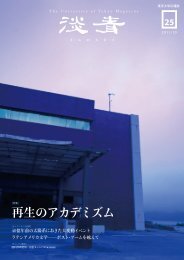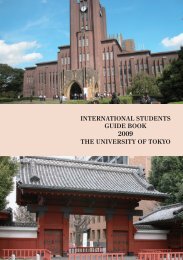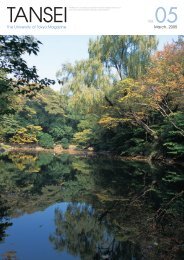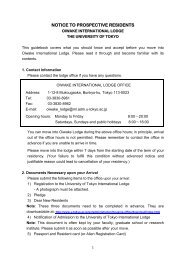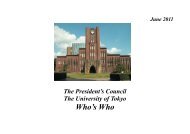brochure
brochure
brochure
Create successful ePaper yourself
Turn your PDF publications into a flip-book with our unique Google optimized e-Paper software.
Graduate School of Interdisciplinary<br />
Information Studies<br />
7-3-1 Hongo, Bunkyo-ku, Tokyo,<br />
113-0033 JAPAN<br />
ITASIA Course: +81-3-5841-0539<br />
itasiaao2013@iii.u-tokyo.ac.jp<br />
http://itasia.iii.u-tokyo.ac.jp/<br />
International Master’s/Doctoral Degree Program:<br />
Information, Technology, and Society in Asia (ITASIA) Master’s/Doctorate<br />
In 2008, the University of Tokyo launched a new International<br />
Master’s/Doctoral Degree Program: Information, Technology, and<br />
Society in Asia (ITASIA) at the Graduate School of Interdisciplinary<br />
Information Studies (GSII). This Program offers intensive graduate<br />
level education designed to foster analytical strength and insight<br />
into Asian societies and international relations, at a time when information<br />
and communication technology is having an increasingly<br />
profound impact on the region.<br />
The Program is tailored to both international and Japanese students<br />
who are motivated to pursue active professional careers on<br />
the regional and the global stage. All instruction is given in English,<br />
so proficiency in Japanese is not a prerequisite. Unlike the conventional<br />
Japanese academic calendar, the academic year at ITASIA<br />
begins in October.<br />
ITASIA is comprised of two Programs: one that grants an M.A.S.<br />
(Master of Arts and Sciences) degree and the other a Ph.D. degree.<br />
Students in the M.A.S. Program are trained to grasp changing<br />
political, economic, and social realities of globalizing Asia through<br />
media, communication, and information studies together with the<br />
related methodology and skills, so that after graduation they can<br />
make appropriate judgments and recommendations in their respective<br />
professional environments. The M.A.S. Program is appropriate<br />
for those interested in pursuing careers in public administration,<br />
media, business, and academic institutions. The Ph.D. Program is<br />
intended to produce high-level researchers and professionals in<br />
the fields of Asian studies and information studies. Students will<br />
acquire a broad-based knowledge of arts and sciences as well as<br />
expertise in the investigative techniques and theoretical analysis<br />
required for advanced research in politics, economics, media studies,<br />
and other social sciences.<br />
Admissions decisions will be based on a written application that<br />
includes TOEFL and GRE scores, rather than on the customary<br />
entrance examination. In some cases the admissions committee<br />
also will conduct some kind of interview.<br />
The GSII, which houses the ITASIA Program, is a unique entity<br />
offering graduate level education. Graduate courses and research<br />
supervision are conducted mainly by faculty members belonging<br />
to the Interfaculty Initiative in Information Studies (III), which was<br />
created together with the GSII in April 2000. Members of many<br />
other faculties in the University also teach and guide students. In<br />
such an environment, interdisciplinary education in information<br />
studies can thrive. The ITASIA Program, for example, is fully supported<br />
by specialists of Asian Studies posted in various faculties<br />
and research institutes within the university, including the Institute<br />
for Advanced Studies on Asia (IASA).<br />
Graduate School of<br />
Frontier Sciences<br />
5-1-5 Kashiwanoha, Kashiwa-shi,<br />
Chiba-ken, JAPAN 277-8561<br />
Student Affairs Section:<br />
+81-4-7136-4007, k-kyomu@kj.u-tokyo.ac.jp,<br />
http://www.k.u-tokyo.ac.jp/index.html.en<br />
Environmental Studies Program<br />
Asian Development Bank Japan Scholarship Program Master’s/Doctorate<br />
As the result of the recent human activity that has been increasing<br />
more rapidly and more widely than ever before in human history,<br />
the earth is facing serious and complex global environmental<br />
problems such as the increase in greenhouse gases in the atmosphere,<br />
the depletion of ozone in the stratosphere, acid rain, soil<br />
erosion, deforestation, loss of biodiversity, and desertification to<br />
name a few. Various disciplines have tried to take on the challenges<br />
related to these abstruse issues throughout human history<br />
being fully aware of the environmental problems. However, of<br />
the individual disciplines of agriculture, economics, engineering,<br />
humanities, law, literature, natural sciences, politics, and social sciences<br />
each has performed their respective investigations with little<br />
collaboration among one another.<br />
The Division of Environmental Studies (DES) believes that<br />
essential solutions to environmental problems can be achieved in<br />
a society that harmonizes relations among humans, artifacts, and<br />
nature. DES consists of six departments: Natural Environmental<br />
Studies; Ocean Technology, Policy, and Environment; Environment<br />
Systems; Human and Engineered Environmental Studies; Socio-<br />
Cultural Environmental Studies; and International Studies. In<br />
addition, the Graduate Program in Sustainability Science— Global<br />
Leader Initiative (GPSS-GLI) is an interdepartmental program supported<br />
by all six departments in the division. With this structure,<br />
DES aims to establish environmental studies as a new academic<br />
field that will lead to the design and creation of the future environment<br />
through a transdisciplinary approach.<br />
Degrees conferred by DES<br />
• Master of Environmental Studies<br />
(departments except for International Studies)<br />
• Master of International Studies<br />
(department of International Studies)<br />
• Master of Sustainability Science<br />
(Graduate Program in Sustainability Science)<br />
• Ph.D.<br />
Student specializations<br />
DES mainly accepts students with a background in the natural<br />
sciences. The Department of International Studies and GPSS,<br />
however, also accept students with a background in the social<br />
sciences or humanities.<br />
55



